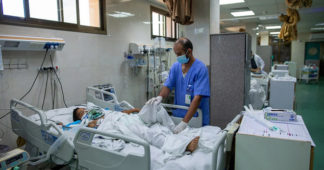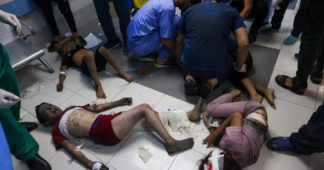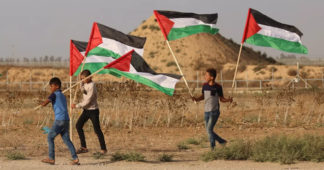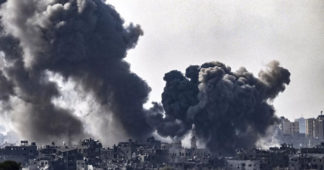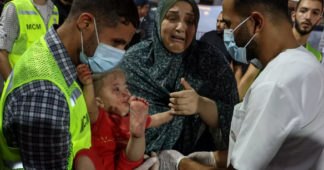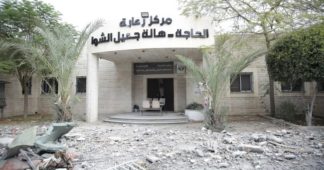Medical staff describe apocalyptic scenes where they have to make life-or-death decisions to rescue those wounded by air strikes
By Aseel Mousa and Abdallah al-Naami
in Gaza, Occupied Palestine
Oct 26, 2023
Doctors in northern Gaza are sounding the alarm about a humanitarian “catastrophe” as Israel continues its ferocious air strikes and siege on the coastal enclave for a third week.
Since Israel cut off all electricity, fuel and water to Gaza on 9 October, hospitals have been overwhelmed, with a lack of life-saving resources and a high volume of critically wounded patients.
Patients who have been wounded in air strikes, pregnant women, children and people with kidney failure are some of the worst affected. The hospitals that are still working are running on generators, which health officials say won’t last long.
In Gaza’s biggest hospital, al-Shifa, doctors are faced with a massive influx of casualties, added to the thousands of displaced civilians taking shelter there.
Bassel Amr, a volunteer ICU physician, highlighted that the number of the wounded brought in all at once is bigger than the hospital’s capacity. This applies to the space in both the urgent care and operation rooms.
“We have 17 operation rooms that are prepared at the same time during massacres and ready to be used. But that is not enough. Most of the wounded need operations,” he told Middle East Eye.
“But we only have the capacity to deal with 17 people at a time, while the rest wait for their turn, and some die in front of your eyes and you cannot help them because the operation rooms are full,” he added.
“The wounded keep dying in front of your eyes but there’s nothing we can do.”
The most traumatising situation faced by Amr and his colleagues is the fact that they have to prioritise some cases over others.
“We are left in a situation where we have to make the difficult decision to risk the life of one patient in order to save the life of another,” he told MEE.
Amr also pointed out that the hospital has no space for post-operative care, and many patients have to sleep in the intensive care units, which he says hinders the work of intensive care doctors. This forces doctors to treat patients on the floor.
“The hospital won’t be able to deal with any other crisis in the coming days as its equipment and necessary tools are already running out,” he warned.
On Wednesday, the United Nations Office for the Coordination of Humanitarian Affairs (OCHA) said that at least 12 out of the 35 hospitals in Gaza are now out of service because of damage from Israeli bombardment and Israel’s decision to cut off fuel supplies to the besieged enclave.
OCHA added that 46 out of 72 healthcare clinics have also shut down, leaving thousands of people without any form of medical aid amid ongoing heavy bombardment.
The remaining clinics and hospitals are running on generators and have few resources to treat patients who have been critically wounded or are in intensive care.
Doctors and health officials have been warning for days that fuel is set to run out completely by Thursday.
They say this will lead to the instant death of thousands of people, including newborn babies in incubators, wounded people in intensive care units, and kidney dialysis patients, among others.
As Israel prepares for its planned ground invasion of Gaza, it has warned residents in the north to flee south to avoid being targeted. That includes hospitals. But health officials at Gaza’s biggest hospitals have insisted the evacuation of the wounded and displaced would be impossible.
Hospitals are also dangerously overcrowded.
As almost 1.4 million people in Gaza are now internally displaced, thousands have taken shelter in hospitals.
Al-Shifa hospital alone is now home to 62,000 displaced people, according to Amr, and viruses are spreading rapidly. This compounds the lack of sterilisation in the hospital for patients, which makes them vulnerable to infections, he added.
International organisations have warned about the spread of water-borne diseases and scabies because of a lack of clean water in the territory.
Amr added that the type of wounds received by his hospital, mainly scarring and disfigurations, indicates another health crisis after the end of hostilities.
“Many of the wounded will live but will have to be on medication for a long time to manage the pain, which may lead to addiction. Others will live with disabilities.”
No shrouds for burial
Hussam al-Madhoun, another doctor, highlighted a similar situation at al-Awda hospital in northern Gaza. He said the hospital “has no space to walk” as thousands of civilians have also taken refuge there from the Israeli bombing.
Similar to al-Shifa, al-Awda doesn’t have enough room for casualties and is suffering a severe shortage of supplies.
“In the beginning, there was a scarcity of medical supplies, now there is a scarcity of available beds at the intensive care unit, and of oxygen, medical and sterilisation materials,” he told MEE.
“I referred a girl with a nerve injury to the neurosurgery department, but was told there was no capacity to take her,” he said.
He added that Gaza is now suffering from a shortage of shrouds.
“There is nothing worse than not finding enough shrouds to cover the martyrs, so you wrap them with garbage bags and old pieces of cloth,” he said.
Al-Madhoun, however, is undeterred.
“I am physically and emotionally exhausted, but this is my duty and I must carry it,” he said.
Meanwhile, at Al-Aqsa Martyrs hospital in central Gaza, the obstetrics department has been converted from delivery rooms and clinics into operating rooms for treating the wounded.
One doctor working in the obstetrics and neonatology department told MEE that the hospital staff are operating “in a state of panic, fear and shock” as Israel has warned them to flee and already bombed a building adjacent to the hospital.
“One night, I was working in my department caring for sick newborns when the Israeli occupation shelled a house next to the hospital. My colleagues and I tried to secure the children,” she said, on condition of anonymity.
Electricity cut off
“Our department suffered damage because of the shelling, and the electricity was cut off for a short time.”
The doctor added that the hospital is now a place of refuge for thousands of displaced people who are fleeing the north of Gaza to the central region seeking safety, on top of the overwhelming number of patients arriving for treatment.
“The sound of ambulances carrying casualties from Israeli air strikes has never ceased over the past couple of weeks; it’s around the clock,” she said.
“The number of casualties is so great that the hospital can no longer accommodate them and is unable to cope,” she added.
“Now, with the ongoing siege and the fuel running out soon, a humanitarian catastrophe is imminent, and we will lose patients in our department and possibly thousands of patients in the entire hospital.”
We remind our readers that publication of articles on our site does not mean that we agree with what is written. Our policy is to publish anything which we consider of interest, so as to assist our readers in forming their opinions. Sometimes we even publish articles with which we totally disagree, since we believe it is important for our readers to be informed on as wide a spectrum of views as possible.
